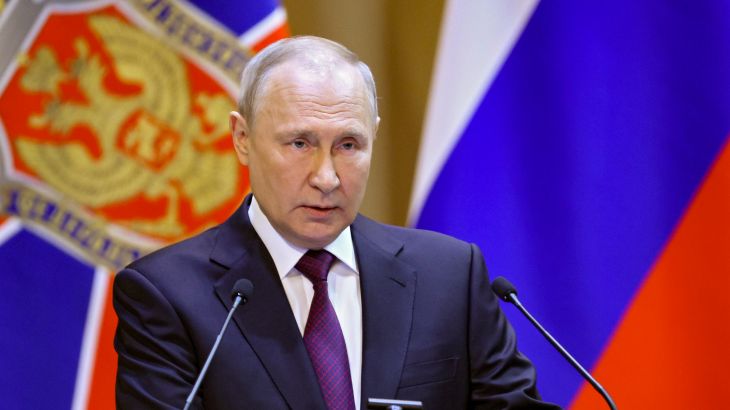ICC issues Putin arrest warrant on Ukraine war crime allegations
Judges say arrest warrant issued over Russian president’s alleged involvement in abductions of children from Ukraine; Moscow says court’s move meaningless.

The International Criminal Court (ICC) has issued an arrest warrant for Russian President Vladimir Putin over alleged war crimes in Ukraine, a move dismissed by Moscow as meaningless.
The Hague-based court said in a statement on Friday the warrant was issued over Putin’s suspected involvement in the unlawful deportation and transfer of children from occupied areas of Ukraine to Russia.
Keep reading
list of 3 itemsCalls for special tribunal for Russia’s ‘war crimes’ in Ukraine
Russia accused of war crimes cover-up by razing Ukraine theatre
“There are reasonable grounds to believe that Mr Putin bears individual criminal responsibility” for the child abductions “for having committed the acts directly, jointly with others and/or through others (and) for his failure to exercise control properly over civilian and military subordinates who committed the acts,” the statement added.
The ICC, which has no powers to enforce its own warrants, also issued a warrant for the arrest of Maria Alekseyevna Lvova-Belova, the commissioner for children’s rights in the office of the Russian president, on similar allegations.
Situation in #Ukraine: #ICC judges issue arrest warrants against Vladimir Vladimirovich Putin and Maria Alekseyevna Lvova-Belova
Read more ⤵️
https://t.co/5OMC7Xuuy5— Int'l Criminal Court (@IntlCrimCourt) March 17, 2023
Russia, which denies committing atrocities since it invaded Ukraine in February last year, rejected the ICC’s move as null and void.
“The decisions of the International Criminal Court have no meaning for our country, including from a legal point of view,” Russian foreign ministry spokeswoman Maria Zakharova said on her Telegram channel after the announcement.
“Russia is not a party to the Rome Statute of the International Criminal Court and bears no obligations under it.”
But ICC President Piotr Hofmanski told Al Jazeera it was “completely irrelevant” that Russia had not ratified the Rome Statute.
“According to the ICC statute, which has 123 state parties, two-thirds of the whole international community, the court has jurisdiction over crimes committed in the territory of a state party or a state which has accepted its jurisdiction,” he said. “Ukraine has accepted the ICC twice – in 2014 and then in 2015.”
Hofmanski said 43 states had referred “the situation in Ukraine to the court, which means they have formally triggered our jurisdiction”.
“The court has jurisdiction over crimes committed on anyone on the territory of Ukraine from November 2013 onwards regardless of nationality of the alleged perpetrators,” Hofmanski said.
The warrants came a day after a United Nations-backed inquiry accused Russia of committing wide-ranging war crimes in Ukraine, including the forced deportations of children in areas it controls.
The legal move provoked a furious response in Moscow.
“Yankees, hands off Putin!” wrote parliament speaker Vyacheslav Volodin, a close ally of the president, on Telegram, saying the move was evidence of Western “hysteria”.
“We regard any attacks on the President of the Russian Federation as aggression against our country,” he said.
The United States is not a member of the ICC. But in a statement from the US State Department, a spokesperson said that “there is no doubt that Russia is committing war crimes and atrocities”. Nevertheless, the spokesperson emphasised that the ICC decision was “reached independently”, separate from the US’s own conclusions.
Ukraine’s Prosecutor General Andriy Kostin, meanwhile, hailed the ICC’s announcement.
“The world received a signal that the Russian regime is criminal and its leadership and henchmen will be held accountable,” he said. “This is a historic decision for Ukraine and the entire system of international law.”
President Volodymyr Zelenskyy blamed Putin for the deportation of thousands of Ukrainian children.
“This is a historic decision which will lead to historic accountability,” he said in his nightly video address. The number of deported children could be “far more” than 16,000, he said, adding that their deportations constituted a policy of “state evil which starts precisely with the top official of this state”.
James Bays, Al Jazeera’s diplomatic editor, described the issuing of the arrest warrants as a “very serious” development.
He said there were many who welcomed the announcement but there were others who raised questions whether this would be a problem for diplomacy going forward.
“Now you have the head of state of Russia, a permanent member of the UN Security Council, who is now a wanted man by the ICC,” he said.
“This is going to be a headache for some of those who are going to have to deal with President Putin. How are other countries going to deal with him?” Bays added. “Will President Putin be able to travel?”
Bays said the decision could also be an issue for the UN, as Secretary-General Antonio Guterres has engaged with Russia throughout its war in Ukraine and even travelled to Moscow to meet Putin.
“Will the UN meet a man who is now wanted with an arrest warrant for him to be sent to The Hague?” said Bays.
Russia has not concealed a programme under which it has brought thousands of Ukrainian children to Russia but presents it as a humanitarian campaign to protect orphans and children abandoned in the conflict zone.
While it is unlikely that Putin will end up in court any time soon, the warrant means he could be arrested and sent to The Hague if travelling to any ICC member states.
“This makes Putin a pariah. If he travels he risks arrest. This never goes away. Russia cannot gain relief from sanctions without compliance with the warrants,” said Stephen Rapp who was the United States Ambassador-at-Large for War Crimes Issues under former president Barack Obama.